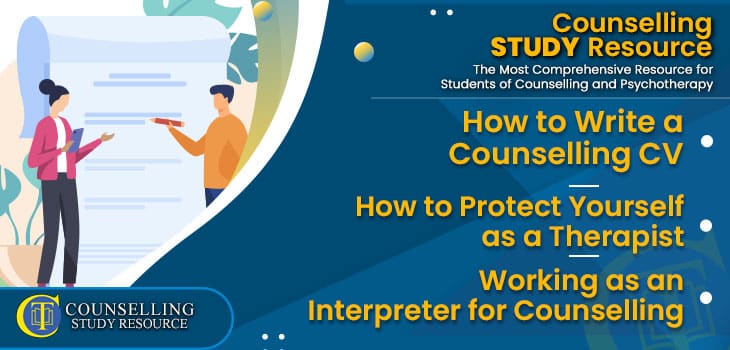267 – How to Write a Counselling CV
How to Protect Yourself as a Therapist – Working as an Interpreter for Counselling
In Episode 267 of the Counselling Tutor Podcast, your hosts Rory Lees-Oakes and Ken Kelly discuss this week’s three topics:
- Firstly in ‘Theory in Practice’, how to write a counselling CV.
- Then in ‘Practice Today’, Rory and Ken discuss protecting yourself as a therapist.
- And lastly in this week’s ‘Practice Matters’, Rory speaks with Eniko Koncz about being an interpreter for counselling.
How to Write a Counselling CV [starts at 02:26 mins]
This segment of the Counselling Tutor Podcast is sponsored by
WebHealer.net
- WebHealer are the go-to provider of websites for private practitioners in the UK.
- Established over 20 years, WebHealer offers a non-technical and fully supported service to help therapists grow their private practice.
- Just one customer from your website each year pays for their service.
Go to WebHealer.net and use coupon CT100 for £100 off their "Do it for me" service.
When it comes to putting together a CV, you want to be presenting the best of what you have to offer. In this section, Rory and Ken go through certain things you might include when writing your counselling CV:
- Your CV should reflect who you are, your views, and your why.
- Include your understanding of ethics, and your commitment to learning and personal development, your perseverance.
- When writing a counselling CCV, include some of your hobbies or personal interests – this will assure the person reading your CV that you have an outlet for self-care.
- Look if you have any transferable skills from things you’ve done in the past.
- Your counsellor CV should open a window – you should be able to talk about the things on your CV, it should include things that invite conversation.
- Include any areas of research you’ve done and been interested in.
- When thinking of how to write your counselling CV, consider what they will want to hear – does anything you’ve done in the past fit in with their values? Do your research on where you’re applying.
- Include headings and highlight/bold certain words you feel are important. When someone is scanning over your CV, certain things should stand out to make them want to read your CV in full.
- Have your CV proofread, read it to yourself out loud.
- Ensure your contact details are easy to find on your CV.
- Show your passion - add why you think you’d be a great fit with where you’re applying.
- Maybe add a letter along with your CV detailing why you are a great fit specifically for where you’re applying and your reason for wanting the position.
- Pay attention to detail.
Theory to Practice is sponsored by
Counselling Skills Academy
Learn counselling techniques by seeing counselling skills used in real sessions by qualified therapists.
Real sessions – real-life presentations – real skills.
How to Protect Yourself as a Therapist [starts at 24:18 mins]
Being a counsellor can come with risks, and it’s important to take measures to avoid it as best you can. In this section, Rory and Ken discuss some of the dangers you may encounter, and how you might consider planning for them:
- Have a separate work phone – you should separate personal from professional as much as you can, specifically in relation to how clients can contact you, this allows you to enforce certain boundaries.
- Think twice about answering a call from a withheld number – if it is a client trying to contact you, they can leave a message and you can get back to them.
- If you're seeing a client alone, do you have a system in place to account for risk? Consider having a ‘buddy’ – someone that you text when a client comes in, and when a client leaves. If they don’t hear from you and can’t get in contact with you, they can alert the police.
- When working for an agency, there should be a lone working policy in place.
- If the session is taking place at a client’s home, or your own, has a risk assessment been made? Does someone know where you are?
- Have a think about these situations and the measures you can put in place so you’re prepared.
Get on-demand Certified CPD that is implementable in your practice
Counsellor CPD Library
- Over 150 hours of on-demand CPD lectures to help you stay current with your CPD ethical requirements
- Support, and be supported, by thousands of other counsellors as a member of the exclusive online community.
- Access your learning anytime you want ... anywhere you choose ... using any device type — desktop or mobile.

Working as an Interpreter for Counselling [starts at 39:33 mins]
In this week’s ‘Practice Matters’, Rory speaks with interpreter Eniko Koncz, finding out more on interpreting counselling sessions.
The key points of this discussion include:
- Eniko can interpret both in Hungarian and in Russian.
- She interprets both online, and in-person.
- By interpreting a session remotely, this allows for more flexibility and less travel.
- Ideally, the counsellor will be in touch beforehand to pass over some information on how the session will be structured e.g. if it’s the first session, the counsellor might be using a questionnaire to conduct a risk assessment, and it will be useful for the interpreter to have access to this beforehand.
- Let the interpreter know what modality you will be working with.
- It might be beneficial to have the interpreter be just a voice, unseen e.g. turning their camera off in an online session, being sat separately during an in-person session
- The interpreter should be able to reflect the tone of the counsellor, interpreting not just the words, but also the feelings.
- Note-taking is very important as an interpreter, they don’t want to interrupt the client during their memory retrieval.
- An interpreter isn’t allowed to paraphrase or summarise, they will repeat what they have heard word for word to the counsellor.
- Providing cultural clarification – making the counsellor aware of how to address a client properly.
- Highlighting the words that cannot be directly translated into English – clarifying that the explanation of that specific word is something that has come from the interpreter, not the client.
- Confidentiality – if you’re working with an interpreter in person, you can politely ask for their notes and dispose of them in front of the client, however, if you’re working online, you’re reliant on the interpreter to ensure they destroy their notes.
- An interpreter should be empathetic, with a high level of emotional intelligence.
The National Counselling and Psychotherapy Society is proud to sponsor Practice Matters.
NCPS (formerly NCS) are really excited to have launched their Children and Young People Therapist Register for counsellors working with the younger age group.
Free Handout Download
Building Your Counselling CV
